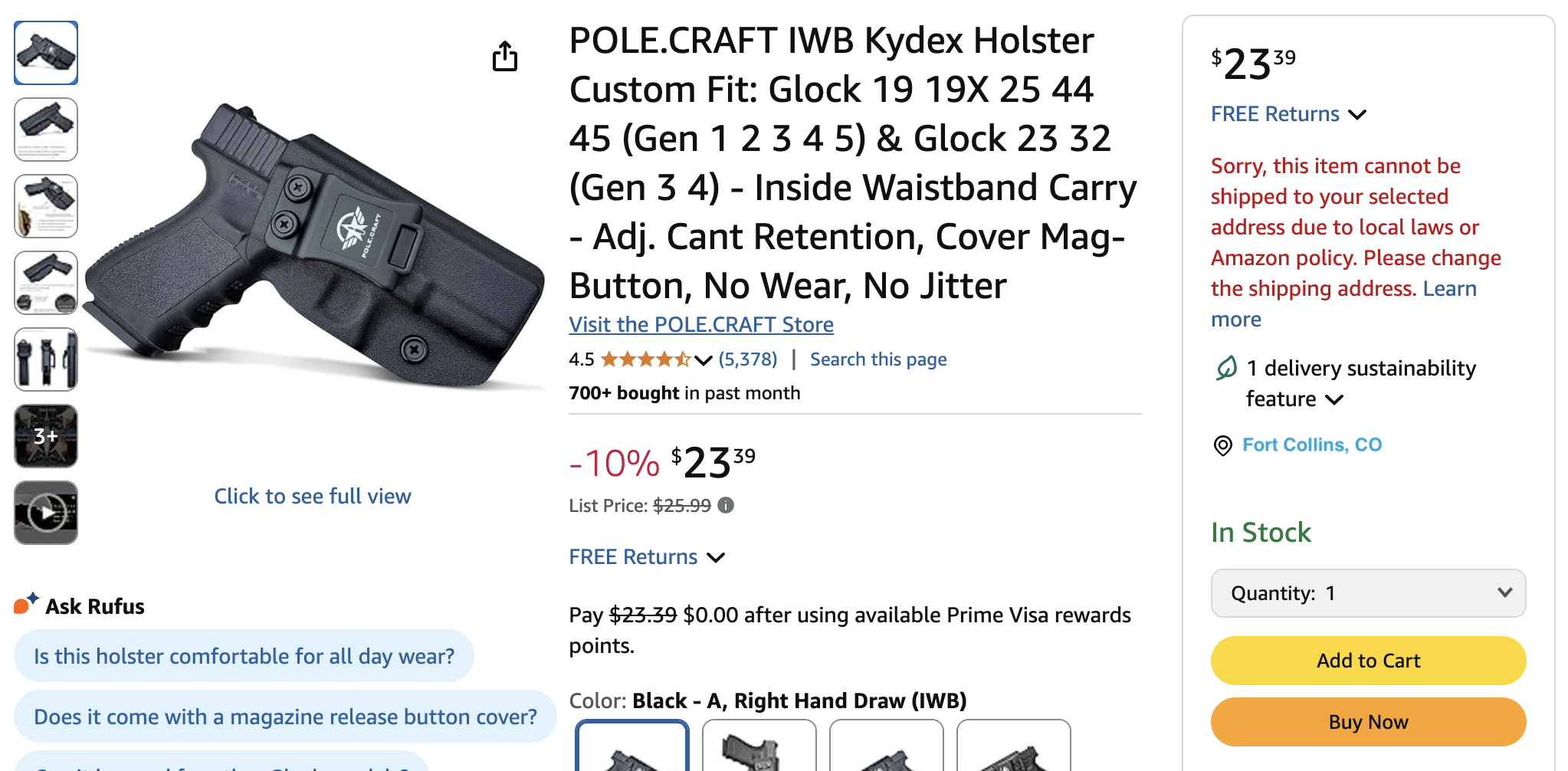The Hidden Cost of Ambiguity: How Colorado’s Confusing Gun Laws Drive Out Businesses, Hurt Consumers, and Fail to Reduce Crime
In Colorado, the conversation around gun rights often focuses on big-ticket legislation—magazine capacity limits, so-called “assault weapon” bans, red flag laws, and more.
But beneath the surface lies a quieter, less-publicized erosion of personal autonomy: the restriction, regulation, and effective banning of otherwise legal firearm accessories.
Holsters, slings, lights, and even simple parts for legally-owned firearms are increasingly hard to purchase online—not because Colorado law bans them outright, but because the legal and regulatory environment has become so unclear that major retailers and suppliers have chosen to walk away entirely. The result? A bureaucratically-induced blackout on lawful commerce that punishes consumers, drives out businesses, and fails utterly at reducing actual gun violence.
Let’s be clear: there is no Colorado law that bans the sale, possession, or shipment of a firearm holster. Yet countless consumers across the state report being unable to purchase them from major platforms like Amazon. Search for a popular holster brand and you’ll often be met with a message that says,
“Sorry, this item cannot be shipped to your selected address due to local laws or Amazon policy. Please change the shipping address.”
Why? Because Amazon and other large retailers have implemented blanket bans on certain items being shipped to Colorado to avoid the legal gray zones created by vague or constantly changing gun regulations. When corporations can’t easily determine what’s legal, they default to “better safe than sorry”—and Colorado gun owners pay the price.
This problem isn’t limited to Amazon. Major manufacturers and suppliers—especially smaller, high-integrity brands like Magpie Tactical—have already ceased doing business in Colorado altogether. Their rationale is simple: it’s too much legal liability and regulatory risk to justify continued operations in a state that can’t clearly define what is and isn’t allowed.
And to be perfectly clear, these are companies that manufacture firearm accessories, not firearms.
They’re not shipping weapons of war—they’re selling slings, light mounts, and holsters. But when a state sends the message that any business involving firearms, even tangentially, is unwelcome, those businesses get the message and leave.
And when they do, the consequences multiply. Consumers lose access to products they previously took for granted. Hunters, recreational shooters, and concealed carry permit holders—many of whom have followed every rule and submitted to every background check—now find themselves unable to buy simple gear to safely and legally exercise their Second Amendment rights. Local gun shops and accessory retailers lose access to suppliers and inventory. And the state loses valuable tax revenue from these legal sales—revenue that could have gone toward education, infrastructure, or even crime prevention.
The irony, of course, is that none of these restrictions actually stop violent crime. Limiting access to a holster does nothing to prevent a criminal from carrying a firearm illegally. Gun violence in Colorado, like elsewhere, is overwhelmingly committed by individuals already prohibited from possessing firearms, often using weapons obtained through illegal means. The idea that someone intent on harm will be deterred because Amazon won’t ship a holster is laughable. But that’s the kind of logic we’re dealing with—reactionary policies and cautious corporate practices that ultimately affect only the law-abiding.
Worse, these policies chip away at personal autonomy. At its core, the right to keep and bear arms isn’t just about owning a tool—it’s about the individual’s right to defend themselves and their families, especially in a world where crime, law enforcement shortages, and political instability have become everyday concerns. When the government creates a hostile environment for businesses that support those rights, and when private companies respond by refusing to sell legal products to lawful citizens, the result is the same: a citizenry with fewer tools to safeguard their own lives.
This death by a thousand paper cuts approach to gun control—where regulation isn’t even always about the law, but about the perception of risk—is particularly insidious because it’s invisible to most people. There’s no press conference, no headline, no vote. It just becomes harder to find the products you used to buy, and more and more companies quietly stop doing business here. Over time, Colorado becomes a no-go zone for firearm-related commerce, not through democratic debate or legislation, but through ambiguity and intimidation.
If you want to see the economic impact of these policies, look no further than the companies that have packed up and left. Suppliers that once paid taxes, employed locals, and supported communities have relocated to states where they’re respected rather than regulated into oblivion. These are states that still believe in the individual’s right to self-determination—and that don’t treat every holster like a threat to public safety.
At RedRefuge, we believe in Your Freedom. Your Family. Your Future. And we believe that starts with respecting personal autonomy and removing barriers to lawful commerce. When a state makes it too difficult to buy a holster, what they’re really doing is making it too difficult to stay. Colorado’s message to lawful gun owners, accessory manufacturers, and Second Amendment supporters has been received loud and clear: you’re not welcome. But that doesn’t mean you’re stuck.
We help individuals and families relocate to states where your rights are recognized—not treated like liabilities. If you’re tired of policies that punish the law-abiding while doing nothing to deter crime, it might be time to find your RedRefuge.
Contact us today to find out more.

